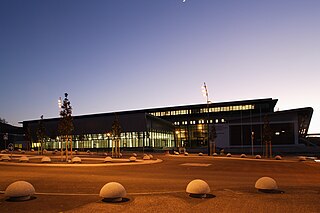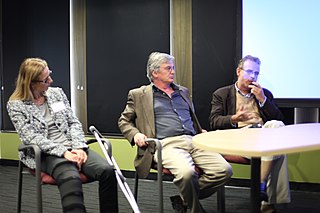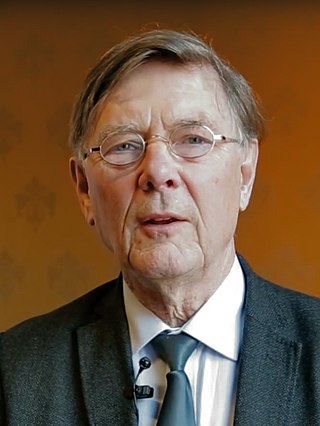Related Research Articles

The Académie des Inscriptions et Belles-Lettres is a French learned society devoted to history, founded in February 1663 as one of the five academies of the Institut de France. The academy's scope was the study of ancient inscriptions (epigraphy) and historical literature.

École nationale supérieure des mines de Saint-Étienne, also called École des Mines de Saint-Étienne or simply Mines Saint-Étienne and commonly abbreviated EMSE is a prestigious French graduate engineering school training engineers and carrying out industry-oriented research. Its function is to support the development of its students and of companies through a range of courses and fields of research, from the initial training of generalist engineers ingénieurs civils des mines, to PhD teaching; from material sciences to micro-electronics via process engineering, mechanics, the environment, civil engineering, finance, computer science and health engineering.

Thierry de Montbrial is the executive chairman of the French Institute of International Relations (Ifri), which he founded in 1979. He is also the founder and chairman of the World Policy Conference (WPC), which he created in 2008. He has been a member of the French Academy of Moral and Political Sciences since 1992. He is an honorary member of numerous foreign academies.
Sir John James Skehel, is a British virologist and Emeritus scientist at the Francis Crick Institute in London. From 1987 to 2006 he was director of the National Institute of Medical Research (NIMR) at Mill Hill which was incorporated into the Crick Institute in 2016.

Thomas Ebbesen is a Franco-Norwegian physical chemist and professor at the University of Strasbourg in France, known for his pioneering work in nanoscience. He received the Kavli Prize in Nanoscience “for transformative contributions to the field of nano-optics that have broken long-held beliefs about the limitations of the resolution limits of optical microscopy and imaging”, together with Stefan Hell, and Sir John Pendry in 2014.

Napoleone Ferrara, is an Italian-American molecular biologist who joined University of California, San Diego Moores Cancer Center in 2013 after a career in Northern California at the biotechnology giant Genentech, where he pioneered the development of new treatments for angiogenic diseases such as cancer, age-related macular degeneration (AMD), and diabetic retinopathy. At Genentech, he discovered VEGF—and made the first anti-VEGF antibody—which suppresses growth of a variety of tumors. These findings helped lead to development of the first clinically available angiogenesis inhibitor, bevacizumab (Avastin), which prevents the growth of new blood vessels into a solid tumor and which has become part of standard treatment for a variety of cancers. Ferrara's work led also to the development of ranibizumab (Lucentis), a drug that is highly effective at preventing vision loss in intraocular neovascular disorders.
Philippe Janvier is a French paleontologist, specialising in Palaeozoic vertebrates, who currently works at the Museum National de l’Histoire Naturelle in Paris. He has written several books and scientific papers on Palaeozoic vertebrates and contributed to the Tree of Life phylogeny project. He has led the largest paleontology research group in France, located in Paris. Janvier received the award of the Grand prix scientifique de la Fondation Simone et Cino del Duca on June 11, 2008, for his work. He was a founding member of the Société Française de Systématique. He is currently Associate Editor of the Comptes Rendus Palevol for paleoichthyology.

Albertus Dominicus Marcellinus Erasmus "Ab" Osterhaus is a leading Dutch virologist and influenza expert. An Emeritus Professor of Virology at Erasmus University Rotterdam since 1993, Osterhaus is known throughout the world for his work on SARS and H5N1, the pathogen that causes avian influenza.
Henri Heim de Balsac was a French zoologist.

Marcelo Miranda Viana da Silva is a Brazilian mathematician working in dynamical systems theory.
Dominique Langevin is a French researcher in physical chemistry. She is research director at the Centre national de la recherche scientifique and leads the liquid interface group in the Laboratory of Solid State Physics at the University of Paris-Sud. She was the Life and Physical Sciences Panel chair for the European Space Sciences Committee of the European Science Foundation from 2013-2021.
Nine Choucroun, born Fortunée Schecroun was a French biochemist. She was director of research at the Institut de biologie physico-chimique in Paris. She developed, inter alia, the electrophoresis.
Francine NtoumiPh.D., HDR, PvDz, FRCPedin is a Congolese parasitologist specializing in malaria. She was the first African person in charge of the secretariat of the Multilateral Initiative on Malaria (2006-2010). In recent years, she has become involved in research on other infectious diseases, including COVID-19.
Grand Prix scientifique de la Fondation NRJ is an award conferred annually by the Foundation NRJ at the Institut de France. It is awarded in the areas of medical science, particularly neuroscience. Each year the prize has a different theme. The award has a €150,000 prize.
The Grand Prix scientifique de la Fondation Lefoulon-Delalande is an award conferred annually by the Lefoulon-Delalande Foundation at the Institut de France. It is awarded in the areas of medical science, particularly cardiovascular science. Each year the prize has a different theme. The award has a €500,000 prize.

Jean Claude Ameisen is a French doctor, immunologist and researcher in biology. He is Director of the Center for Life Studies of the Paris Institute of Humanities, Paris Diderot University and President of the National Consultative Ethics Committee (2012–2016).
Clément Cogitore is a French contemporary artist and filmmaker. Combining film, video, installations and photographs, Cogitore questions the modalities of cohabitation between humankind and its own images and representations.

Claire Julie Liliane Wyart is a French neuroscientist and biophysicist, studying the circuits underlying the control of locomotion. She is a chevalier of the Ordre national du Mérite.
Élisabeth Tournier-Lasserve is a French neurologist, medical geneticist, university professor and hospital practitioner in genetics. Together with three colleagues, she was the co-recipient of the Brain Prize in 2019, the world's largest brain research prize.
References
- 1 2 "Grand Prix scientifique de la Fondation Louis D." Institut de France. Grands Prix des Fondations. Retrieved 2019-04-28.